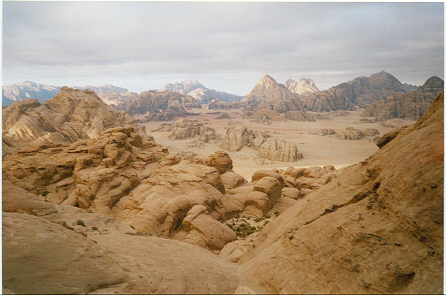 |
Wadi Rum has been made a protected area, “to protect the desert plants and animals”. Now the Jordanian Royal Society for the Conservation of Nature (RSCN), which administers the protected area, seems to be trying to place serious restrictions on the local peoples freedom of movement and traditional lifestyle. The Beduin of Rum fear that in the longer term, the plan is to get them out altogether, as happened to the Beduin of Petra. The RSCN say that overgrazing is destroying “rare” plants and that the goats and camels must be reduced in number and / or put in fenced compounds. (Jails for animals, as Hamad said.) The Bedu say that their animals have always grazed the desert plants without destroying them. (Traditional rotational grazing.) The animals are not just of economic importance, but a crucial part of social identity. It is the women and girls who take the goats out to graze ; if they no longer did this they would be stuck at home. It is hard to get information from the RSCN and government ministries. The local people have been attending meetings with the authorities - incuding at least one meeting which was arranged but which the authorities didn't bother to turn up for. The Bedu feel that they are not really listened to and that the city Jordanians treat them like stupid children. Thus they feel that their government would listen to westerners (potential "tourists"?) more than to the local people themselves, and that international pressure by writing letters etc might help. They asked me to help, hence this web site. There are also issues of much more direct concern to visiting climbers and trekkers. There seems to be some danger of climbing being banned except in "designated areas" which would probably be limited to E. face of Jebel rum, and Barrah canyon. (The attempt to severely restrict climbing has been made before, but when enough people shouted, the RSCN backed off and said it was all a misunderstanding. ) Also of wild camping in the desert being banned (as “dangerous”) and all visitors having to stay in four large, organised, “tourist camps”. The RSCN are also trying to stop visitors making their own arrangements with local guides. Climbers in particular often do this, either because they have visited before and made friends, or because they need guides with specialist knowledge of the climbs and scrambles. There are 'Rangers' driving round in new 4wds with walkie-talkies, turning up and hassling the locals, asking for evidence that the people with them are a "pre-arranged tour"...if not, then people like us can't get our friends to take us out but have to take the first in the queue at the rest house – who may not even know where particular climbs are. (See Alan’s letter for more detailed discussion of this point.) What are the authorities trying to do ? 1) BAN CLIMBING except in certain "designated areas".(No info yet on where these would be) 2) BAN WILD CAMPING and make all visitors stay in organised camps. 3) Stop visitors making their own arrangements with local guides. 4) Stop the Beduin from using their traditional camps in certain areas. 5) Stop the Beduin from using their traditional grazing in certain areas. What do we think should be done ? 1) Traditional Bedouin rights to the land should be respected. The Beduin should retain their rights to camp and travel where they choose,and to graze their animals. (Traditional practices are not as damaging as some people seem to believe - see J Hobbs Bedouin Life in the Egyptian Wilderness.) 2) Bedouin climbing and trekking guides should not be part of the rota system, which is only suited to guides for the standard jeep tours. 3) Climbing should not be limited to certain areas. It should be allowed in all areas provided that environmental measures are respected – see the draft guidelines produced by Tony Howard and Di Taylor. 4) Trekking on foot or camel should not be limited to certain areas. It should be allowed in all areas, provided that environmental measures are respected – see the draft guidelines produced by Tony Howard and Di Taylor. (And perhaps subject to a limit on group size in certain areas.) 5) Camping should not be limited to organised tourist camps. Wilderness camping should continue to be allowed, providing environmental measures are respected. 6) No permanent construction should be allowed, except in the area of the existing village. 7) The village and its people should stay where they are, if that is where they want to live. They should not be forced to move. |
 |
| What is happening in Wadi Rum ? |
| Photo : Angie Bishop |